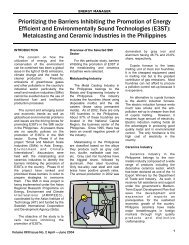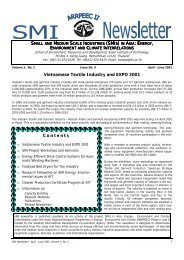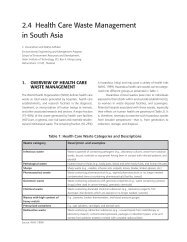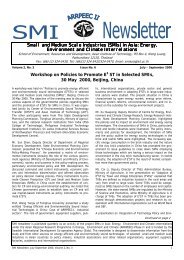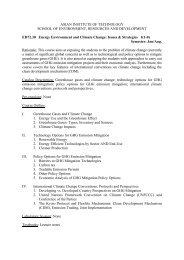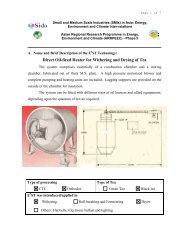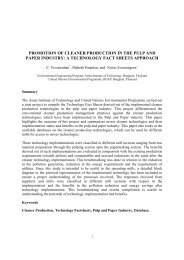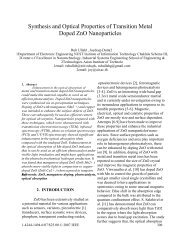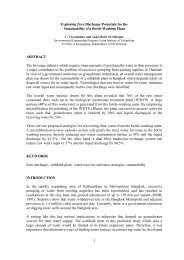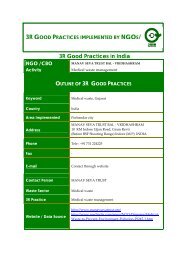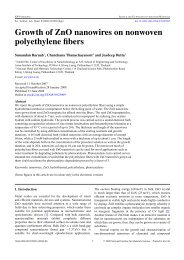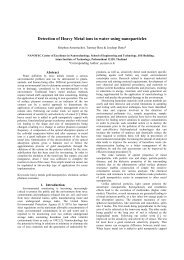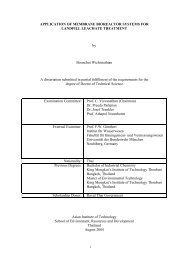A Gap Analysis in Selected Asian Countries, 3R Knowledge Hub ...
A Gap Analysis in Selected Asian Countries, 3R Knowledge Hub ...
A Gap Analysis in Selected Asian Countries, 3R Knowledge Hub ...
Create successful ePaper yourself
Turn your PDF publications into a flip-book with our unique Google optimized e-Paper software.
F<strong>in</strong>d<strong>in</strong>gs<br />
On-go<strong>in</strong>g difficulties <strong>in</strong> solid waste<br />
management can be attributed to shortage <strong>in</strong><br />
skilled and experienced human resources to<br />
manage and operate waste management<br />
systems; appropriate equipment to ensure cost<br />
effective collection and transportation of waste;<br />
accessible f<strong>in</strong>ances due to <strong>in</strong>efficient revenue<br />
generation; and remuneration of workers to<br />
encourage effective operation.<br />
In the past, recyclable materials were kept and<br />
either used, sold or exchanged. However as<br />
progress is made and consumption grows,<br />
disposal practices are chang<strong>in</strong>g with grow<strong>in</strong>g<br />
volumes of waste be<strong>in</strong>g dumped everywhere.<br />
Unfortunately, this has been paralleled with a<br />
contraction <strong>in</strong> the recyclable materials markets.<br />
Materials, which were previously exported to<br />
neighbor<strong>in</strong>g countries where the systems are<br />
present to undertake commercial recycl<strong>in</strong>g have<br />
either disappeared or shrunk <strong>in</strong> most cases,<br />
except for the very high value materials<br />
(alum<strong>in</strong>um and other selected metals).<br />
Additionally, export duties have been<br />
<strong>in</strong>troduced which makes the recycl<strong>in</strong>g markets<br />
uneconomical. This has led to an <strong>in</strong>crease <strong>in</strong> the<br />
volumes of waste be<strong>in</strong>g dumped.<br />
HEALTHCARE WASTE<br />
The M<strong>in</strong>istry of Health is responsible for<br />
healthcare throughout the country. Hospitals,<br />
by and large, have facilities with more than 50<br />
beds and are publicly owned. On the other<br />
hand, health centers generally have less than 50<br />
beds and are often publicly owned. Cl<strong>in</strong>ics and<br />
polycl<strong>in</strong>ics are usually under the private sector<br />
and only offer outpatient services. Most<br />
hospitals and health centers were constructed<br />
dur<strong>in</strong>g the 1950s and 1960s, while a number of<br />
polycl<strong>in</strong>ics and cl<strong>in</strong>ics are presently built to<br />
meet the dramatically <strong>in</strong>creas<strong>in</strong>g population,<br />
particularly <strong>in</strong> Phnom Penh.<br />
Limited <strong>in</strong>formation is available regard<strong>in</strong>g the<br />
management of healthcare waste <strong>in</strong> Cambodia.<br />
The World Health Organization has conducted<br />
a survey <strong>in</strong> 44 healthcare facilities; 10 hospitals,<br />
14 polycl<strong>in</strong>ics, 12 cl<strong>in</strong>ics, and 8 health centers<br />
(WHO, 2003). The results of the survey <strong>in</strong>dicate<br />
that hospitals, polycl<strong>in</strong>ics, cl<strong>in</strong>ics, and health<br />
centers generate about 825 kg of solid waste per<br />
day. Of these, about 403 kg is considered<br />
medical waste, and the rest is considered<br />
general waste.<br />
The survey also reveals that most hospitals,<br />
polycl<strong>in</strong>ics, cl<strong>in</strong>ics, and health centers do not<br />
have their own systems for waste segregation.<br />
Different types of wastes, <strong>in</strong>clud<strong>in</strong>g <strong>in</strong>fectious,<br />
sharp, and pathological waste, are placed <strong>in</strong> the<br />
same b<strong>in</strong> or conta<strong>in</strong>er, which is not colored and<br />
labeled. However, waste segregation is carried<br />
out by some hospitals and polycl<strong>in</strong>ics. Syr<strong>in</strong>ges<br />
are stored separately from other waste at the<br />
po<strong>in</strong>t of generation. For <strong>in</strong>stance, some facilities<br />
put the syr<strong>in</strong>ges <strong>in</strong>to bottles of pure water,<br />
while others put them <strong>in</strong>to safety boxes.<br />
A secondary collection system normally is<br />
carried out by the PSBK Company, which was<br />
given this responsibility by the Municipality of<br />
Phnom Penh. The company uses compactors for<br />
the collection and transportation of waste from<br />
hospitals, polycl<strong>in</strong>ics, cl<strong>in</strong>ics, and health centers.<br />
The frequency of collection is once a day, except<br />
national holidays and weekends. Ironically, the<br />
categories of solid waste to be collected by the<br />
company have not been clearly def<strong>in</strong>ed <strong>in</strong> the<br />
contract. In other words, the company is<br />
entitled and responsible to collect all categories<br />
of solid waste with<strong>in</strong> the city.<br />
Cambodia presently does not have a special<br />
treatment facility or central <strong>in</strong>c<strong>in</strong>eration plant<br />
for treatment of medical waste. A large amount<br />
of general and medical waste produced by<br />
hospitals, polycl<strong>in</strong>ics, cl<strong>in</strong>ics, and health centers<br />
is collected by the PSBK Company and disposed<br />
at an open dump<strong>in</strong>g site known as Stung Mean<br />
Chey. The site has been used s<strong>in</strong>ce 1960 and has<br />
an area of about 8 ha. It is not equipped with<br />
appropriate technologies for solid waste<br />
management. The leachate from this site is<br />
discharged directly <strong>in</strong>to the public sewer.<br />
A few hospitals are equipped with conventional<br />
<strong>in</strong>c<strong>in</strong>erators for burn<strong>in</strong>g healthcare waste. It has<br />
been reported that the operat<strong>in</strong>g temperature <strong>in</strong><br />
those units ranges from 350 0 C to 600 0 C. It has<br />
also been determ<strong>in</strong>ed that the healthcare wastes<br />
cannot be completely destroyed at these<br />
temperatures.<br />
Chapter 3: Country <strong>Analysis</strong><br />
35




